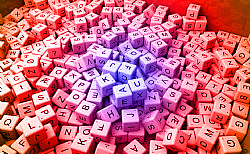Untamed imagination?
Fantasy is, perhaps, the genre most associated with the untamed imagination. It’s that place of no boundaries, a generic construct out of which you can create any tale your (perhaps diseased) brain can slap together. Want to pen a tome about gigantic goats that ride on midgets and stab each other with blocks of cheese? Go for it – if you can make it work, you’ll probably find an audience. Aye, but then that’s the rub, isn’t it – can you make it work? If you’re able to remain detail-oriented and you’re focused, you might be able to pull it off. You’ll have to adhere to an all-encompassing key rule, though.
This most intrinsic notion is true in all story realms, but especially true in the Fantasy genre because there’s a heavy onus on you to make sense out of something inherently nonsensical: the world you create must have rules. Can you make those rules up? Totally – in fact, that’s what you should be doing. But they have to be defined, and for that you’re going to have to build a legend.
Let’s say you create a character that has the power to produce chairs out of thin air that he can manipulate to attack his enemies. That seems a bit ridiculous at a simple first glance, so how do you bolster this attribute? Perhaps, centuries ago, his family was made up of carpenters. When they ran afoul of a local magician, he cursed them; soon, all of their handmade creations began to lynch them.
Ah, but the family rebounded! Why? Because all of their furniture was made out of wood from the trees in the Magical Forest, a forest that grew out of the Battle between the Gods Bartles and James, and because of this pedigree the furniture can be manipulated by the power of its creators to do its bidding. Over the centuries your young hero’s family mastered the art of controlling their curse, and voila! It’s now their greatest power.
Who’s ever heard of a fighting chair, right? But it’s your vision and if you’re creating the rules, a fighting chair can make all the sense in the world – especially in this one. The key is to building up the legitimacy of this place you’ve created by establishing a legend, a legacy, to build forth on.
Methods of relation
On an opposite token, however, you have to devise a method of relation as well – something for your readers to connect even the most insane portions of your world to their own life. Maybe common families in your world have domesticated pets, like dogs or cats, except these are dragon-looking monsters that feed on old metal. Perhaps they play a sport but it’s fantastical, like Quidditch in Harry Potter. Stephen King, in his Dark Tower series, created an alternate world in which, somehow, everyone knew the words to Hey Jude. However you spin it, the idea has to be “They’re just like us, but in a different place.” Somehow, what makes humans human must also make even your non-human characters somewhat human and your alien landscape somehow a little less far from our own.
And when you get down to it, this basic rule – define your world and build it via those definitions – is the key to every element in the genre. It extends from your setting to your characters, your plot line, your magical spells, the way battles are fought and the ultimate outcome. Before you begin your novel, develop your legend as fully as possible. Know it inside and out, because it’s the key to either making or breaking the entirety of your imagination.
About the Author:
Time to write that fantasy novel you’ve been eager to get started on? Here’s a great novel writing course that will guide you through the process: Novel Writing Made Easy by Amanda Schuller. And for more great writing articles visit: The Successful Writer.



